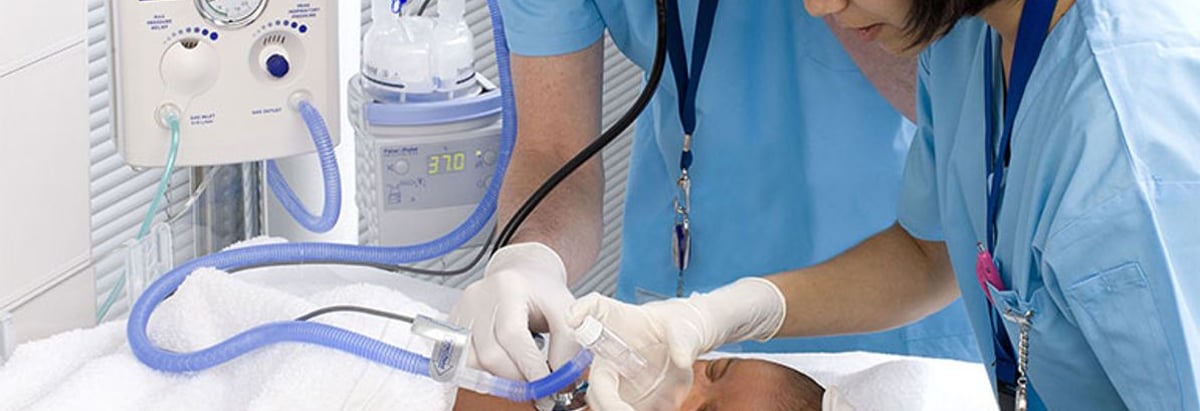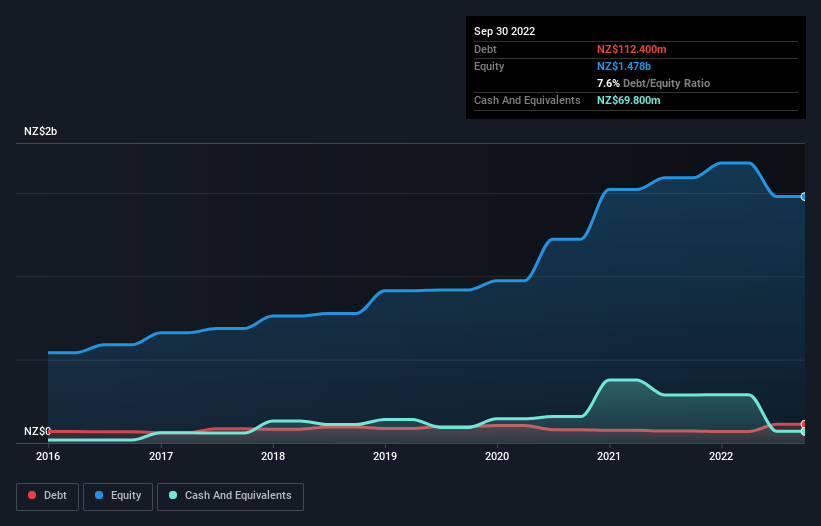- New Zealand
- /
- Medical Equipment
- /
- NZSE:FPH
Does Fisher & Paykel Healthcare (NZSE:FPH) Have A Healthy Balance Sheet?

Some say volatility, rather than debt, is the best way to think about risk as an investor, but Warren Buffett famously said that 'Volatility is far from synonymous with risk.' It's only natural to consider a company's balance sheet when you examine how risky it is, since debt is often involved when a business collapses. As with many other companies Fisher & Paykel Healthcare Corporation Limited (NZSE:FPH) makes use of debt. But should shareholders be worried about its use of debt?
When Is Debt Dangerous?
Debt is a tool to help businesses grow, but if a business is incapable of paying off its lenders, then it exists at their mercy. Ultimately, if the company can't fulfill its legal obligations to repay debt, shareholders could walk away with nothing. While that is not too common, we often do see indebted companies permanently diluting shareholders because lenders force them to raise capital at a distressed price. Having said that, the most common situation is where a company manages its debt reasonably well - and to its own advantage. When we think about a company's use of debt, we first look at cash and debt together.
View our latest analysis for Fisher & Paykel Healthcare
How Much Debt Does Fisher & Paykel Healthcare Carry?
The image below, which you can click on for greater detail, shows that at September 2022 Fisher & Paykel Healthcare had debt of NZ$112.4m, up from NZ$72.3m in one year. However, it also had NZ$69.8m in cash, and so its net debt is NZ$42.6m.

How Strong Is Fisher & Paykel Healthcare's Balance Sheet?
According to the last reported balance sheet, Fisher & Paykel Healthcare had liabilities of NZ$368.6m due within 12 months, and liabilities of NZ$247.5m due beyond 12 months. Offsetting this, it had NZ$69.8m in cash and NZ$222.6m in receivables that were due within 12 months. So its liabilities outweigh the sum of its cash and (near-term) receivables by NZ$323.7m.
Since publicly traded Fisher & Paykel Healthcare shares are worth a total of NZ$12.8b, it seems unlikely that this level of liabilities would be a major threat. Having said that, it's clear that we should continue to monitor its balance sheet, lest it change for the worse. But either way, Fisher & Paykel Healthcare has virtually no net debt, so it's fair to say it does not have a heavy debt load!
We use two main ratios to inform us about debt levels relative to earnings. The first is net debt divided by earnings before interest, tax, depreciation, and amortization (EBITDA), while the second is how many times its earnings before interest and tax (EBIT) covers its interest expense (or its interest cover, for short). This way, we consider both the absolute quantum of the debt, as well as the interest rates paid on it.
Fisher & Paykel Healthcare's net debt is only 0.10 times its EBITDA. And its EBIT covers its interest expense a whopping 412 times over. So we're pretty relaxed about its super-conservative use of debt. The modesty of its debt load may become crucial for Fisher & Paykel Healthcare if management cannot prevent a repeat of the 53% cut to EBIT over the last year. When it comes to paying off debt, falling earnings are no more useful than sugary sodas are for your health. There's no doubt that we learn most about debt from the balance sheet. But it is future earnings, more than anything, that will determine Fisher & Paykel Healthcare's ability to maintain a healthy balance sheet going forward. So if you're focused on the future you can check out this free report showing analyst profit forecasts.
Finally, while the tax-man may adore accounting profits, lenders only accept cold hard cash. So it's worth checking how much of that EBIT is backed by free cash flow. In the last three years, Fisher & Paykel Healthcare's free cash flow amounted to 38% of its EBIT, less than we'd expect. That weak cash conversion makes it more difficult to handle indebtedness.
Our View
Fisher & Paykel Healthcare's EBIT growth rate was a real negative on this analysis, although the other factors we considered were considerably better. There's no doubt that its ability to to cover its interest expense with its EBIT is pretty flash. We would also note that Medical Equipment industry companies like Fisher & Paykel Healthcare commonly do use debt without problems. When we consider all the elements mentioned above, it seems to us that Fisher & Paykel Healthcare is managing its debt quite well. Having said that, the load is sufficiently heavy that we would recommend any shareholders keep a close eye on it. The balance sheet is clearly the area to focus on when you are analysing debt. But ultimately, every company can contain risks that exist outside of the balance sheet. For example - Fisher & Paykel Healthcare has 1 warning sign we think you should be aware of.
When all is said and done, sometimes its easier to focus on companies that don't even need debt. Readers can access a list of growth stocks with zero net debt 100% free, right now.
New: AI Stock Screener & Alerts
Our new AI Stock Screener scans the market every day to uncover opportunities.
• Dividend Powerhouses (3%+ Yield)
• Undervalued Small Caps with Insider Buying
• High growth Tech and AI Companies
Or build your own from over 50 metrics.
Have feedback on this article? Concerned about the content? Get in touch with us directly. Alternatively, email editorial-team (at) simplywallst.com.
This article by Simply Wall St is general in nature. We provide commentary based on historical data and analyst forecasts only using an unbiased methodology and our articles are not intended to be financial advice. It does not constitute a recommendation to buy or sell any stock, and does not take account of your objectives, or your financial situation. We aim to bring you long-term focused analysis driven by fundamental data. Note that our analysis may not factor in the latest price-sensitive company announcements or qualitative material. Simply Wall St has no position in any stocks mentioned.
About NZSE:FPH
Fisher & Paykel Healthcare
Designs, manufactures, markets, and sells medical device products and systems in North America, Europe, the Asia Pacific, and internationally.
Flawless balance sheet with high growth potential.

